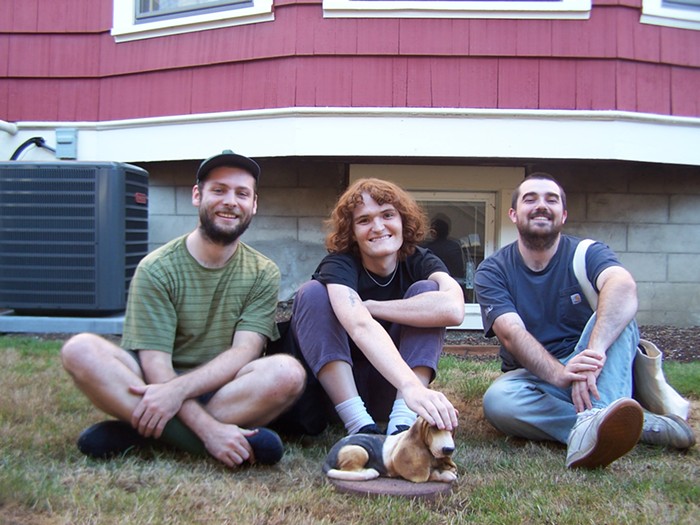WHAT WORKED ON Plants and Animals' 2008 debut Parc Avenue—a branching, organic, groovy, and at times profoundly stirring rock record—proved hard to duplicate. No longer did the Montreal trio have endless reserves of time and space in which to tinker and explore. They took on fans, tours, a label, and managers. Music became their job.
"Expectations are a whole other kettle of fish," says drummer Matthew "Woody" Woodley. "I guess that's why so many bands suffer the dreaded sophomore slump."
Despite their then-newfound working parameters, Plants and Animals approached 2010's La La Land much the same way they did Parc Avenue, entering the studio without songs and piecing them together on tape. With some hindsight, Woodley recognizes there were pressures. But, he says, "I don't think we thought about it at the time."
For their third LP, The End of That, Plants and Animals upended the old model. "One of the motivations was to be able to [record] the songs live," Woodley says. "There is magic in the first couple of takes that you can't really get if you're doing it over and over again, even if you get the parts right. There's just something in the feel."
So last spring, with songs in hand, the trio headed to a studio on the outskirts of Paris. They weren't looking for isolation or inspiration in some exotic new place. "It wasn't so much going to France," Woodley says, noting that all three band members speak French at home in Montreal. "It wasn't the moment in the country and the culture as much as it was this amazing house, 20 minutes out of Paris, kind of in the countryside.
"Up on the main floor," Woodley continues, "there's a couple of grandiose living rooms you can record in with the doors open and the birds chirping outside, and this old wooden staircase that goes up to the other two floors, where you can put mics for the most amazing reverb anywhere."
Their third LP The End of That reflects those bright, open spaces. The arrangements run from Stones-y vamps to lush, explorative classic rock. It is catchy and electric, delivered with a crisp, shimmering clarity.
Whether most listeners will be able to really dig in, however, will hinge on their relationship with singer Warren Spicer, who finds himself at the very front of the mix. Spicer doesn't so much play for spotlight as appear naked beneath it. Everything is bared. The diary is open, and none of the lines have been crossed out.
At times, Spicer is incisive as he wrestles with the looming shadows of adulthood and modern life. In the title track, he perfectly encapsulates the aimless condition of Western hipsters: "Coping with a life of luxuries, focus on my defeats." But over the course of the very same song Spicer drops a number of bumbling metaphors and clunky platitudes that jolt me stupid.
In person, the band's virtuosity should outweigh these lyrical pratfalls. They can really play. (They also recently added a bass player to better re-create the record's fullness.) But Plants and Animals may be a band whose multiple visions sometimes conflict. The End of That has such a pristine sound and a familiar, accessible mélange of rock tropes it's not hard to imagine them crossing over to a Starbucks playlist. Then again, unvarnished and heavy truths pop off alongside these sunnier tracks; when everything lines up, as it does on "Lightshow," the band can bite.
"We didn't want to make something that was too dark," says Woodley. "I wanted music that had a little more of a smile or sun around it. I think it does, despite the darker subject matter. I think everything comes with kind of a wink and a grain of salt."



















